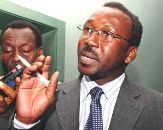Sudan rebels hope consultations will break Darfur talks deadlock
ABUJA, Sept 12 (AFP) — Rebel negotiators at African Union-brokered peace talks in Nigeria on the conflict in Sudan’s western Darfur region said Sunday they were hopeful ongoing consultations will break a deadlock on key issues.
 The peace talks between the Sudanese government and two rebel groups — the Sudan Liberation Movement (SLM) and Justice and Equality Movement (JEM) — were suspended until Tuesday because of differences over security and disarmament.
The peace talks between the Sudanese government and two rebel groups — the Sudan Liberation Movement (SLM) and Justice and Equality Movement (JEM) — were suspended until Tuesday because of differences over security and disarmament.
“I think we are becoming hopeful. The informal discussions going on at the instance of the special envoy may eventually break the deadlock,” SLM spokesman Abduljabbar Dofa told AFP in the Nigerian capital.
Dofa said the rebel groups “are very anxious to make peace so as to end the agony and killing of our people.”
During the suspension of the talks, AU special envoy General Abdusalami Abubakar, a Nigerian former military ruler, has been meeting with Sudanese government officials and rebel leaders to try to bridge the gap.
Up to 50,000 people have lost their lives and some 1.4 million displaced since February 2003 when the black African rebels took up arms against the government in Khartoum to protest at the political and economic marginalisation of their region.
Khartoum’s response was to unleash a proxy Arab militia, the Janjaweed, on the region, arming them, backing them and giving them a free rein to crush the rebellion.
US Secretary of State Colin Powell on Thursday told a Senate hearing that evidence compiled by the United States led to the conclusion that genocide had been committed in Darfur.
He said the government of Sudan and the Janjaweed militia bore responsibility and that “genocide may still be occurring”.
Democratic presidential hopeful John Kerry late Saturday used the same word, saying the United States and UN Security Council must “decide whether to take action to halt the killing in Darfur or remain idle in the face of the second African genocide in 10 years”.
The Sudanese government has rejected Washington’s charge, dismissing it as a re-election ploy by US President George W Bush, while the rebels welcomed it, saying they had been vindicated.
“We have stated and restated since January that there is a systematic policy of ethnic cleansing and genocide taking place in Darfur,” JEM chief negotiator Mohammed Ahmed Tugod told AFP.
Talks in Abuja were suspended on Friday to resume on Tuesday, after meetings with Nigerian President Olusegun Obasanjo, who is also the AU chairman, back from an AU summit in Burkina Faso last week.
Relief agencies have begun airlifting supplies into Darfur and neighbouring Chad, where heavy rain has rendered roads impassable, but the UN World Food Programme last week warned that hundreds of thousands of people remained at risk.
At the United Nations, Washington has been lobbying to win the Security Council round to agreement on terms for its second resolution since July to try to stop the killing.
A previous Security Council resolution warned of sanctions if Khartoum failed to stop the killing, but when a deadline expired last month the international community was divided over whether such pressure was appropriate.
